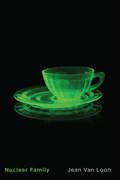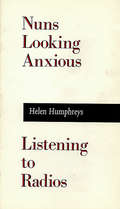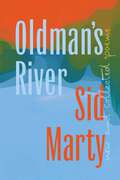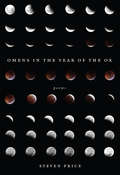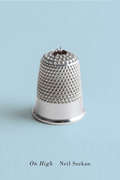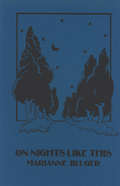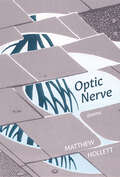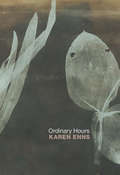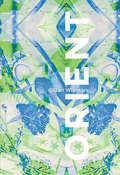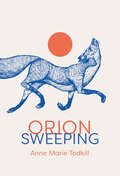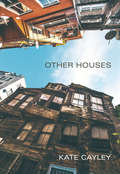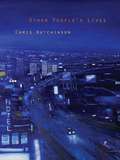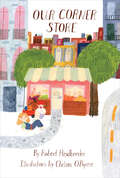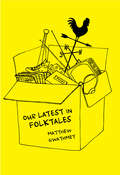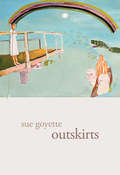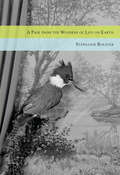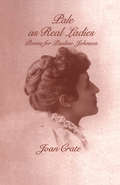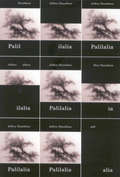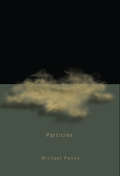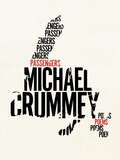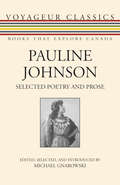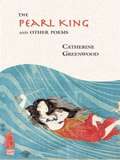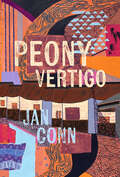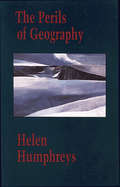- Table View
- List View
Nuclear Family (Hugh MacLennan Poetry Series)
by Jean Van LoonIn the night her whitened toes / cold sole on his calf / between his palms he warms / a slender foot – / twig bones, taut skin.Jean Van Loon’s father was a metallurgist in an Ottawa lab that contributed to the Manhattan Project. The Geiger counter he brought home exposed her mother’s dinner plate as radioactive. Her childhood friend’s father sold cobalt bombs to the Soviet Union. Unbeknownst even to the family, her mother worked for Canada’s Cold War intelligence service.Rooted in memory and history, Nuclear Family carries the reader into the sense of impending nuclear doom and the explosions of material wealth that shaped Van Loon’s childhood. Poems come alive with image, sound, and texture, portraying the innocence of childhood games, the worldwide effects of prolonged nuclear testing, and the long-lasting legacy of her father’s suicide – a fallout of radioactive silences.In Nuclear Family violent events, both global and familial, permeate a girl’s coming of age in a story of cataclysm and, ultimately, recovery.
Nuns Looking Anxious, Listening to Radios
by Helen HumphreysAlcuin Citation in 1991 for excellence in book design in Canada. Nuns Looking Anxious, Listening to Radios is a work in the hazard of retrieval. What sticks in retrospect? Seldom what you would expect, not always the happiness. Otherwise you could train for life, you could actually learn from grandmothers, mothers; poems -- those bodies of lines and spaces -- would not appear unbidden bearing news you hold your breath to hear. Helen Humphreys comes through the rich reproach of the past into the present, a bruise, a beautiful bloom.
Oldman's River: New and Collected Poems
by Sid MartySid Mary is a voice to be reckoned with.Beloved for his intimate, lyrical poetry, Marty’s depiction of selfhood, connection to place and to landscape have proven him a unique and dissenting voice in Canadian literature as well as a consistent presence in the Canadian environmental movement. These are poems, often strongly resonant of western speech, that celebrate all the vicissitudes of rural life, the loves and losses, the valleys and peaks of life on the prairies, foothills and in the mountains of Alberta and British Columbia.This first-ever collected works, featuring forward written by Kit Dobson and Owen Percy, and interview conducted by Pamela Banting, brings together old and new poems, published and unpublished works, in a celebration of the career and artistry of a Western Canadian icon.
Omens in the Year of the Ox
by Steven PriceSteven Price’s second collection is part of a long-lived struggle to address the mysteries that both surround and inhabit us. The book draws together moments both contemporary and historical, ranging from Herodotus to Augustine of Hippo, from a North American childhood to Greek mythology; indeed, the collection is threaded with interjections from a Greek-style chorus of clever-minded, mischievous beings—half-ghost, half-muse—whose commentaries tormentingly egg the writer on. In poems that range from free verse to prose to formal constructions, Price addresses the moral lack in the human heart and the labour of living with such a heart. Yet the Hopkins-like, sonorous beauty of the language reveals “grace and the idea of grace everywhere, in spite of what we do.” The pleasures of Price’s musicality permeate confrontation with even the darkest of human moments; the poems thus surreptitiously remind us that to confront our own darkness is one of the divine acts of which humans are capable.
On High (Hugh MacLennan Poetry Series #43)
by Neil SurkanAll songs have skin, / all skin has holes. On High, Neil Surkan's debut collection of poetry, searches for spirits in myriad places. Wondering how, why, and when to act with a conscience, speakers try out steep hikes, strong drugs, and earnest meditations as they attempt to make meaning in a divided and distracting world. Careful and tense, On High balances on all kinds of tightrope-like lines: a trout fisher revels after riding a moose, a buzzed lover speculates about human connection, new condo owners toast from balcony to balcony, a young woman kicks a hornet's nest into her hometown library's erotica/poetry/religion section. Reaching for the sprigs of our shared humanity, Surkan's poems offer courage and compassion in violent times. As the speaker in "The Branch Breaker" muses, "sarcasm won't dissolve our enemies." On High is a book for the contemporary moment.
On Nights Like This
by Marianne BlugerMarianne Bluger knows what it is to be at sea; oceans of sad and beautiful possibilities wash her poems. And she feels the warmth and fixity of anchorage in home. Tender by nature but tough at need, her language deftly negotiates a course between these poles.
Optic Nerve
by Matthew HollettPoems using fervent whimsy and wordplay to examine photography and seeing. Peering inside eyeballs, pondering the paradox of absent stars, and meditating on street scenes by André Kertész, these poems squint sidelong at our ways of seeing the world. Through playful poems about photography and visual perception, Hollett dissects auroras and quarks, atmospheric phenomena, potatoes, bomb craters and peat bog cadavers. This darkly comic collection is shadowed by entoptic paparazzi, haunted by peripheral visions. Born of attentive walking and looking, of footsteps and snapshots, it bears witness to art history and alluvial light, portable keyholes, the pandemic, climate change, and the sheer strangeness of seeing everyday things with ecstatic eyes.
Ordinary Hours
by Karen EnnsIn Ordinary Hours, the follow-up to Karen Enns' Gerald Lampert Award-nominated first collection, That Other Beauty, we revisit Enns' rural Mennonite childhood, replete with the sensuousness of "diesel fuel" and "hot peaches." Enns also explores the Mennonite exodus from Russia, tracking its faint but unmistakable reverberations in the daily lives of its survivors and revealing the redemptive character of that dailiness. Reading an Enns poem feels effortless: her rhythms and phrasing are so minutely calibrated that the poem unfolds as if of its own accord.
Orient
by Gillian Wigmoreorient is the third collection from one of Western Canada's most accomplished poets. Composed mainly of three long poems—an extended meditation on the connection between man and fish, the lament of a big-souled cowboy poet looking up from rock bottom, and a historical envisioning of an intimate relationship between a pioneer and a powerful crone—orient leaps, sings, burrows down, and orients the reader within its rich ecosystem. The appeal of these poems lies partly in their blend of humility (the open-minded approach), in their force (the taut style, the original vision) and in an astonishing boldness. Wigmore is a "poet of place"; in the best sense: "about the big picture."
Orion Sweeping
by Anne Marie TodkillAnne Marie Todkill's debut recalibrates the anxiety of the present. It gives doubt a hearing, finding resilience in fragility and grace in unexpected places. The poems assembled in Orion Sweeping take nothing at face value. What are we to make of a radioactive souvenir, a shape-shifting dog, landscapes made strange by time? The speakers gathered here seek to set the record straight: a mink gives advice; a wolf disputes a rumour; a photographer zooms in on a kill; a military strategist gives lessons in peace. But the sum of the evidence is not bleak. A baby arrives as robustly as a whale; the solidarity of marriage is enacted in surprising ways; father and daughter share a gift for reprieve. Under the penetrating gaze of these poems, beauty and tenderness come quietly into view.
Other Houses
by Kate CayleyFrom acclaimed fiction writer and playwright Kate Cayley—poems that illuminate the deep strangeness of the familiar. In Other Houses, Kate Cayley’s second collection of poetry, objects are alive with the presence of the people who have handled them. Myths and legends are interwoven with daily life. Visionaries, mystics, charlatans, artists, and the dead speak to us like chatty neighbours. An imaginary library catalogues missing people. Reading becomes a way of remembering the dead. Home is an elsewhere we are “called to,” a mystery that impels children to wander off, and adults to grow in unexpected directions. Cayley couples a rich, meaty lyricism with the intimacy of direct address, creating a poetry that is at once embodied and spectral. She directs us to wonder, “Did light and dark have a taste and texture, like food?” At the same time, her command of voice and narrative is masterful—each of these poems unfolds with the sweep and precision of a compressed novel. …Walking alone, you come upon a single glove, or shoe, pressed into the light snow. Or find a handprint on the wrong side of a windowpane. Or find a collection of marbles, still grouped carefully together in the backyard. Messages.(from “The Library of the Missing”) Praise for Other Houses: "Beware of Kate Cayley. With an agility stolen from some other world she flicks this one open and invites us to watch our certainties scuttling away. Predatory and unsettling, these exquisitely crafted poems suggest that we are at our most human when yearning to reach beyond the visible.” —Martha Baillie
Other People's Lives: The History of a London Lot
by Chris HutchinsonExciting music, delicious ironies, radiant self-awareness. With imagination, wit and scrupulous candour, Chris Hutchinson’s poems negotiate and renegotiate the shifting no-man’s-land between self and others, introspection and public life. Here are poems carrying unflinching perceptions on their own innovative, edgy music, refusing inflations of rhetoric and complacent notions of the inner life, bringing skeptical intelligence and radical imagination-those supposedly incompatible room-mates-into electrical connection. The result is a poetry of daring honesty, close observation, and humanity, executed with exhilarating verve and humour.
Our Corner Store
by Robert HeidbrederThis delightful novel in verse follows the adventures of a brother and sister around the neighborhood, and especially at the corner grocery store! Race you to our corner grocery store!Stanstones’ corner store is the heart of the neighborhood for the brother and sister in this story. They help to close the store every Saturday and save their pennies to buy candy. The store is the source of many adventures, where they spend a memorably spooky Halloween, play tricks on Mr. and Mrs. Stanstones, and form a search party to find Toby the store cat when he goes missing. What will happen to their beloved corner store when a brand-new supermarket opens up in town? Full of humor and playful language, this novel in verse is a sweetly nostalgic celebration of a time when children had more freedom and a mom-and-pop corner store might be the center of a kid’s world. Based on Robert Heidbreder’s childhood, this follow-up to Rooster Summer can be read as a sequel or a stand-alone story. Chelsea O’Byrne’s vibrant illustrations bring the corner store and its colorful cast of characters to life. Correlates to the Common Core State Standards in English Language Arts: CCSS.ELA-LITERACY.RL.2.4 Describe how words and phrases (e.g., regular beats, alliteration, rhymes, repeated lines) supply rhythm and meaning in a story, poem, or song.
Our Latest in Folktales
by Matthew GwathmeyPoems of serious wordplay—an affirmation and celebration of the spectacles we make of our lives. On-stage in Matthew Gwathmey’s debut collection are agitated 19th century horsemen, 80s comic book beetles, plaid-clad suburban grunge enthusiasts, Korean aunts turned traffic cops, Parisian mimes—in short, “a multitude of horns.” Meanwhile, the “understories,” the sub-spectacles of these poems, are the everyday trials and thrills of marriage and family, the search for meaningful love and friendship, and the palpable relief at being able to perform not as a primary character in the cultural narrative, but as a member of an elemental audience, as “water/ at the bottom of the wind.” Working a hand-mixer in one hand and a spade in the other, Gwathmey writes formally accomplished, linguistically playful poems with deep roots. He couples an implicit understanding of the stories passed down to us as necessary blueprints, with an occasionally nihilistic (in the spirit of the modernists) and occasionally giddy (in the spirit of the New York School) pull toward embellishment and reinvention, making these folktales rhythmic, humorous, and full of unexpected turns.
Our Little Kitchen
by Jillian TamakiA picture book about a lively evening in a community kitchen from Governor General’s Award–winning author and illustrator Jillian Tamaki. Tie on your apron! Roll up your sleeves! Pans are out, oven is hot. The kitchen’s all ready, Where do we start?In this lively, rousing picture book from Caldecott Honoree Jillian Tamaki, a crew of resourceful neighbours come together to prepare a meal for their community. With a garden full of produce, a joyfully chaotic kitchen and a friendly meal shared at the table, Our Little Kitchen is a celebration of full bellies and people looking out for one another. Includes two recipes and an author’s note about the volunteering experience that inspired the book. Key Text Features illustrated recipes author's note speech bubbles Correlates to the Common Core State Standards in English Language Arts: CCSS.ELA-LITERACY.RL.1.4 Identify words and phrases in stories or poems that suggest feelings or appeal to the senses. CCSS.ELA-LITERACY.RL.2.4 Describe how words and phrases (e.g., regular beats, alliteration, rhymes, repeated lines) supply rhythm and meaning in a story, poem, or song.
outskirts
by Sue GoyetteWinner of the 2012 Pat Lowther Memorial Award Winner of the 2012 Atlantic Poetry Prize Sue Goyette's outskirts is a tour de force. Its originality lies in Goyette's refusal of despair, her conviction that the connections among people, their conversation, curiosity, empathy and awe, can help us see a way forward. Her aim is to find energy in human love, a way to walk the darkness rather than hide from it. This book will name you, and frighten you; make you laugh, and arm you for what is to come.
A Page from the Wonders of Life on Earth
by Stephanie BolsterShortlisted for the 2012 Pat Lowther Memorial Award An ambivalent zoo-tour, an open-eyed meander through a landscape of made and contained things. A Page from The Wonders of Life on Earth is a book with a coherent vision of nature -- constructed or framed, both in the present and in the recent past -- through zoos, aviaries, formal gardens, menageries, and books like the Time-Life one named in the title. Informed by the author’s grand tour of these zoos and gardens, these poems provide a strong lens for considering the many paradoxes of inter-species relations; they open up the possibility of honest, unsentimental elegy. The book is also a model of what might be called investigative poetry, taking the poet’s combination of perceptual acuity, craft, music and sensibility into these richly troubled places (prisons of, monuments to, museums for the lost natural world) where "arcades sell postcards of old photographs of the arcades," and where questions of what it means to be human, to be animal, to be other and to be art are tangibly in the air. This is Bolster's best work.
Pale as Real Ladies: Poems for Pauline Johnson
by Joan CrateIn powerful language that reflects the conflicts between the primitive and the sophisticated, Joan Crate redreams the passions which animated and tormented her famous predecessor. Part white, part Mohawk princess, Pauline Johnson /Tekahionwake would perform her poems first in buckskin, then, after the intermission, in silk.
Palilalia (Hugh MacLennan Poetry Series #19)
by Jeffery DonaldsonPalilalia is disordered speech. According to the Oxford English Dictionary, this lesser known vocal tic is "an involuntary repetition of words, phrases or sentences." Sister to echolalia (repeating what others say), and distant cousin to the more forbidding coprolalia (the involuntary use of obscene language), palilalia can feel, on the one hand, like an affliction to be suppressed, and on the other, like a kind of meditative mantra that focuses and intensifies your thought. "Your repetitious tics," the ghost of the poet's mentor, Northrop Frye, tells him, are " the ecstatic rhapsodist's / St. Vitus Dance, slangster's whizzle / and conjuration, philologist's hullabaloo." It isn't a question of how to stop them, but of finding how far they will take you. Jeffery Donaldson offers poems about Tourette's Syndrome, about his loves and blessings, about the erotic life as flavoured by all these, and about the grace of a stillness in the midst of so much mental noise. Paul Val�ry said that a poem is never finished, only abandoned. All poets have palilalia, or should have....
Particles: Particles (Hugh MacLennan Poetry Series #43)
by Michael PennyMichael Penny addresses his poems directly to the reader, challenging you to satisfy your need to investigate and understand the sensory and intellectual assumptions we use to make sense of our world. Balanced between abstract metaphysical challenges and the concrete and commonplace, Penny's poetry considers a range of topics, including cars, bruises, lotteries, pine needles, and dogs, infusing each with strangeness and unexpected intrigue. A lively and surprising collection, Particles joins together inner and outer space and suggests that you might not know what you think you know.
Passengers
by Michael CrummeyThe sixth and, on the surface, most innovative poetry collection from Scotiabank Giller Prize finalist Michael Crummey. Eclectic, unpredictable, and strange, Passengers follows Swedish poet Tomas Tranströmer on an imagined circumnavigation of Newfoundland; traces the island escapades of Lucifer from the time of his arrival as a stowaway in the Middle Ages; and wanders the pre-pandemic cities of Europe, touching down in Stockholm’s ABBA museum, the Belfast Public Library, Austria’s plague cemeteries, and the Czech Republic’s Punkva Caves. Widely considered “one of Canada's finest writers” (Globe and Mail), Crummey is noted for the immediacy and emotional impact of his poetry and fiction and for his ability to raise the vernacular to planes of “exquisite beauty.” Part travelogue, part archeological dig, Passengers is an eccentric guide to the wild geography, folklore, and misbegotten history of the human heart.
Pauline Johnson: Selected Poetry and Prose
by Pauline Johnson Michael GnarowskiHalf-Mohawk, half-English author Pauline Johnson astounded Canada with her unique poetry, prose, and presentations. Pauline Johnson was an unusual and unique presence on the literary scene during the late 19th and early 20th centuries. Part Mohawk and part European, she was a compelling female voice in the midst of an almost entirely male writing community. Having discovered her talent for public recitation of poetry, Johnson relied on her ancestry and gender to establish an international reputation for her stage performances, during which she appeared in European and native costume. These poems were later collected under the title of Flint and Feather (1912) and form the source of the selections appearing in this volume.Later, suffering from ill health, Pauline Johnson retired from the stage and devoted herself to the writing of prose, collected in Legends of Vancouver, The Moccasin Maker (1913), and The Shagganappi (1913), gleanings from which form part of this collection.
The Pearl King and Other Poems
by Catherine GreenwoodNotable Book in the 2005 Kiriyama Prize and longlisted for the 2005 ReLit Awards Catherine Greenwood draws on the stories and legends which surround the development of cultured pearls by Mikimoto, the fabulous Pearl King, to engage a rich array of themes, including the clash between an aesthetics of refinement and nuance, and mass manufacture. With discerning wit and a large range of styles and voices, she holds up each subject for contemplation as though it were a pearl, and explores the sometimes bizarre consequences of an overwhelming rage for beauty. As the seal is strong and breathes air, As the fish is quick and breathes water, So make me, a mermaid strong and quick. Bless me with abalone abundant as mushrooms, Oysters dropping ripe as plums into my palm. Let my births keep me ashore a few days only, Only for a little while let labour make me rest. from "The Diving Girls’ Prayer" When, in other sections of the book, Catherine Greenwood turns her attention to such matters as the still birth of a calf, teeth, moles, or the Shetland Island stone, she does so with the same care for the exact fit of style, the same sharply-angled craft. "The ancient Taoists believed that a pearl was grounded at the soul’s centre, that it took wisdom and clarity to create its essence. Catherine Greenwood’s first collection of poems is proof of that. Here is a new pearl, the beginning of a strand I hope, that will continue to be added to with such depth of field and luminosity." - Don Domanski
Peony Vertigo
by Jan ConnPoems emerging from deep memory and shifting landscapes to joyously engage flora, fauna, and self. In her latest collection, Peony Vertigo, Jan Conn's poetic sensibility disperses and gathers, careens and slides, in and out of relation with the endangered world. Through poems ranging from global to microscopic scales, Conn's beholden, fluid sense of self dissolves into fog and river, and reconstitutes as bright orange newt, prehistoric horse, painter, and mourning daughter. Her voice is vulnerable, ecstatic, and elliptical, a tender exploration of liminal consciousness and the urge to identify with environments in crisis.
The Perils of Geography
by Helen HumphreysIn her third book of poetry The Perils of Geography, Helen Humphreys charts a world that opens under the prodding and promise of language. With the wit and eye for evocative detail which gained readers for both Gods and Other Mortals and Nuns Looking Anxious, Listening to Radios, Humphreys probes the immediacy of now, the intensity of this, the residue of then. Don’t be deceived by the spare appearance; her poems are resonant and full, "all angles and confidence." Light falls slant across them. She maps "what surrounds not what's made still" -- "the moving line." The line she traces connects the pull of memory and moment, open roads and winter aconite, transcendental basements and ornamental shrubbery. In "Singing to the Bees," the ten poem sequence which makes up the second of three sections in Perils, she slips inside folk wisdoms, wears them with an easy grace, all flesh and wit and possibility: dancing shoes, gifted pigs, swarming bees, airplane nuns and spectre ships. These poems make superstition delicious.
